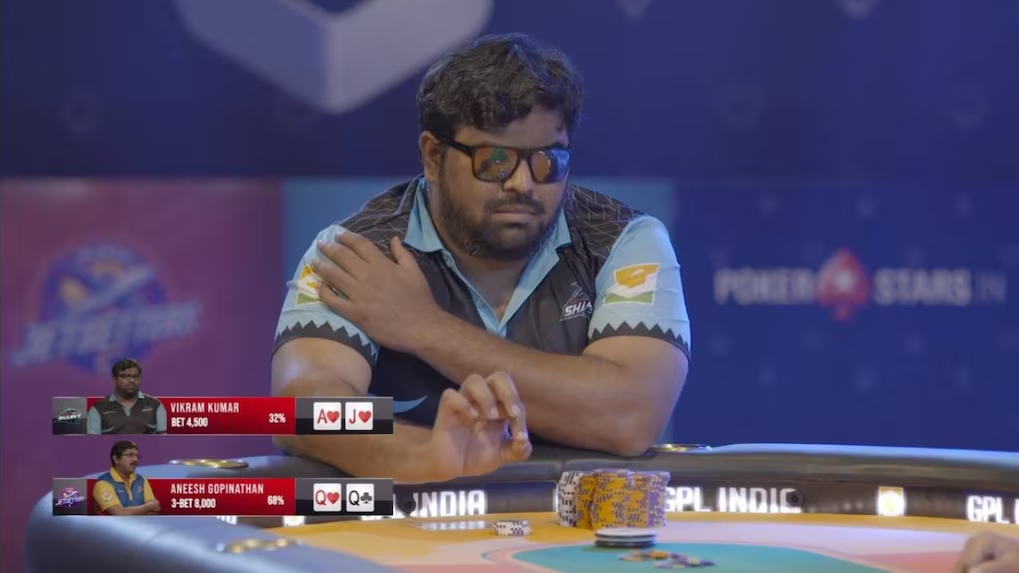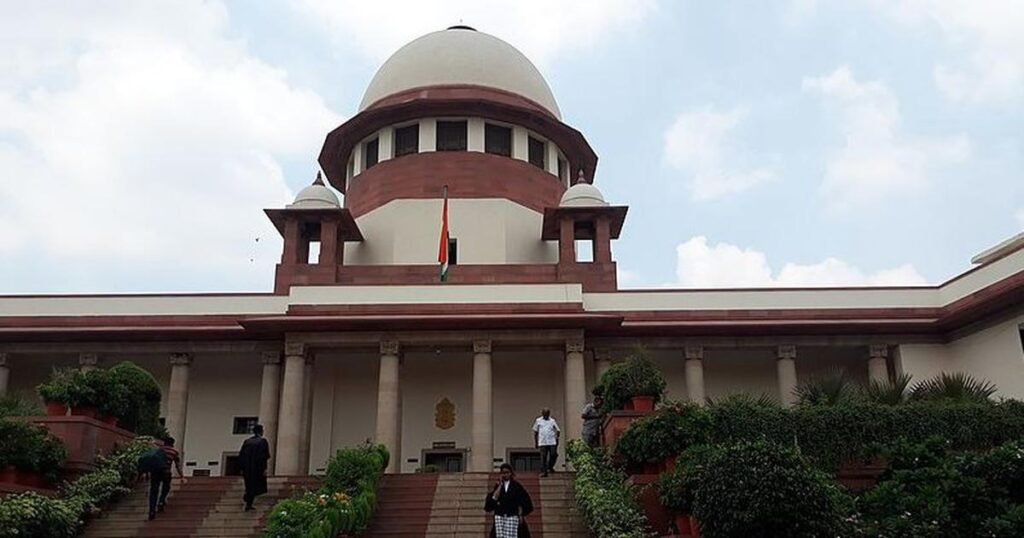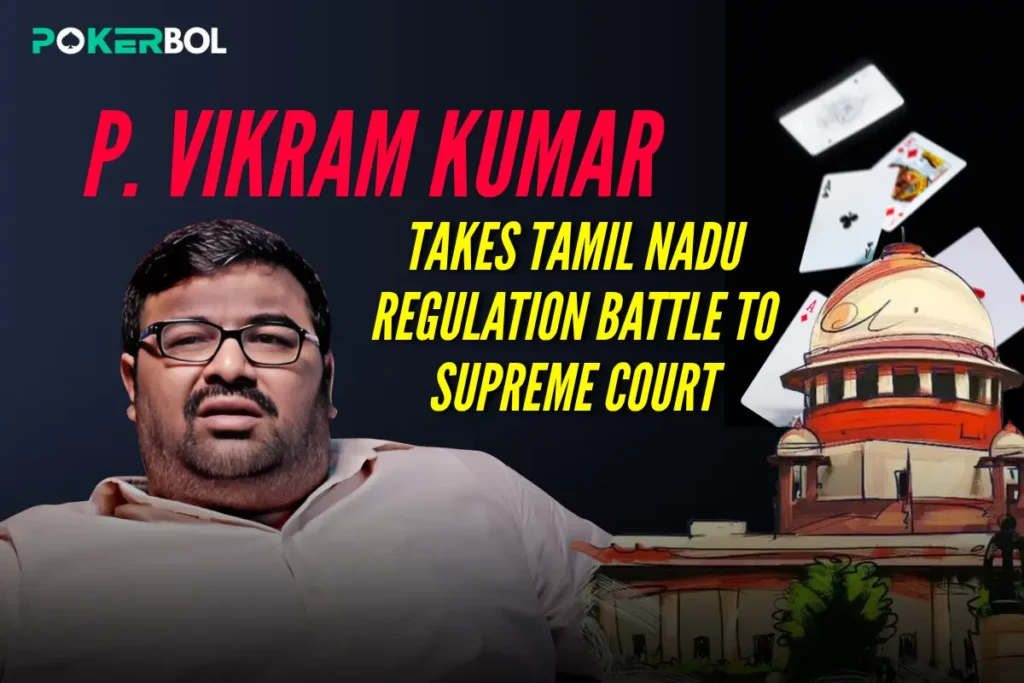Professional poker player P. Vikram Kumar has sparked a significant legal battle by challenging the Tamil Nadu Online Gaming Authority (Real Money Games) Regulations, 2025, in the Supreme Court. The petition, filed as a Special Leave Petition (Civil), contests the constitutionality of the regulations that restrict his ability to earn a livelihood through online gaming. Kumar, known for his achievements at the World Series Poker Championship and recipient of the ‘Player of the Year 2017’ award from the Global Poker Index, claims that the state’s move encroaches upon his constitutional rights.
Also Read: Madras High Court Backs Tamil Nadu’s Online Gaming Ban and Aadhaar KYC: Impact on Poker & Rummy

P. Vikram Kumar’s Petition: A Stand for Digital Freedom
Kumar, a Chennai-based poker professional with over 18 years of experience, has been earning his living through both online and offline poker tournaments. His petition argues that the regulations, particularly the ban on online real money games between 12 AM and 5 AM and the requirement for Aadhaar-based Know Your Customer (KYC) verification, violate his right to privacy and livelihood.
The regulations, enacted under the Tamil Nadu Prohibition of Online Gambling and Regulation of Online Games Act, 2022, have become a cause for concern among poker professionals like Kumar. The petition challenges these rules, claiming they undermine individual freedoms and constitute a form of government overreach.
Legal and Constitutional Challenges
The petition submitted by Kumar argues that the regulations infringe upon his rights under Article 19 (freedom of profession) and Article 21 (right to life and liberty) of the Indian Constitution. Kumar contends that these restrictions lack empirical evidence supporting their claim that online gaming negatively affects public health. Furthermore, he points out the discriminatory nature of the “blank hours” regulation, which imposes restrictions solely on online real money games but fails to address other potentially addictive digital platforms.
Kumar’s legal team also raises the issue of privacy violations due to the mandatory Aadhaar-based KYC requirement, which they argue violates individual privacy rights. The petition stresses that the central government, through the Ministry of Electronics and Information Technology, already has the jurisdiction to regulate online gaming under the Information Technology (Intermediary Guidelines and Digital Media Ethics Code) Rules, 2021. Kumar argues that the state’s regulations conflict with these national standards.
Also Read: Tamil Nadu Government’s Struggle with Real Money Gaming Laws: Privacy Concerns vs. Safety Measures
Background of the Dispute: Tamil Nadu’s Legal History with Online Gaming
This is not the first time Tamil Nadu has faced legal scrutiny over its regulation of online gaming. The state previously attempted to ban online poker and rummy, classifying them as games of chance. However, the Madras High Court struck down these efforts, ruling that these games are based on skill and are therefore protected under the Constitution.
Despite these setbacks, the state passed the Tamil Nadu Prohibition of Online Gambling and Regulation of Online Games Act, 2022, and issued new regulations in February 2025. These regulations included provisions for KYC verification, cautionary warnings, and the controversial ban on gameplay between midnight and 5 AM. Kumar’s petition argues that these actions represent an attempt to circumvent previous court rulings and undermine his constitutional rights.

The Madras High Court’s Judgment: A Misapplication of Constitutional Law?
In June 2025, the Madras High Court dismissed Kumar’s writ petition, asserting that the state had the legislative competence to impose such regulations under the State List of the Constitution. The court justified the restrictions on the grounds of public health concerns, deeming them reasonable in the interest of societal well-being.
However, Kumar’s legal team contests this reasoning. They argue that the court failed to conduct a proportionality analysis, as required by the Supreme Court in matters of privacy and free speech. The petition also points out that the High Court wrongly assumed that online gaming poses a public health risk without considering substantial evidence to support such claims.
The Road Ahead: What’s Next for P. Vikram Kumar?
Kumar’s legal team has called upon the Supreme Court to review and set aside the judgment of the Madras High Court, urging the court to declare the Tamil Nadu Online Gaming Authority Regulations as unconstitutional. As the case moves forward, the outcome will have far-reaching implications for the future of online gaming regulation in India, especially for professionals like Kumar who depend on it for their livelihood.
FAQs
- What is the Tamil Nadu Online Gaming Authority (Real Money Games) Regulation?
The Tamil Nadu Online Gaming Authority (Real Money Games) Regulation, 2025, imposes restrictions on online gaming, including a ban on real money games between 12 AM and 5 AM and mandatory Aadhaar-based KYC verification for players.
- Why is P. Vikram Kumar challenging the regulation?
Kumar is challenging the regulation because it interferes with his ability to earn a livelihood through online poker, violates his constitutional rights to privacy and freedom of profession, and lacks evidence to support claims of public health harm.
- What is the role of Aadhaar-based KYC verification in the regulation?
The regulation mandates that players undergo Aadhaar-based KYC verification, which Kumar argues violates individual privacy rights and places an undue burden on private entities that are responsible for implementing it.
- What is the legal significance of this case for online gaming in India?
The case has the potential to shape the future of online gaming regulation in India, especially regarding issues of privacy, digital autonomy, and the role of state versus central government in regulating digital platforms.
- What could be the impact of the Supreme Court’s decision?
The Supreme Court’s decision could either uphold the state’s regulation or strike it down, setting a precedent for how future regulations in online gaming will be evaluated in terms of constitutional rights.


2 Comments
Pingback: Are Indian Betting Apps Protecting Players or Profiting from Them? - Poker News India – Latest Poker News, Tips, Strategies, Reviews, Blogs & More
Pingback: India's Gaming Future: Supreme Court's Decision